Macroecology 2019
Macroecology 2019 - Bridging local patterns and global challenges

11th March 2019 – 14th March 2019
At the Biocenter of the University of Würzburg
Am Hubland
97074 Würzburg
General

The Macroecology 2019 meeting will be the 13th annual meeting of the specialist group Macroecology of the Ecological Society of Germany, Austria, and Switzerland (GfÖ). The Specialist Group on Macroecology of the GfÖ is one of the leading scientific platforms for macroecological topics in central Europe. With the topic ‚Bridging local patterns and global challenges‘, we invite contributions ranging from ‘small data’ to questions of global relevance for biodiversity research. Hence, Macroecology 2019 aims to foster the dialogue between empiricists dealing with local patterns, bioinformaticians, data scientists, theoreticians and modellers from central Europe and beyond, promoting scientific exchange and progress.
The Macroecology 2019 will be held at the Biocenter of the University of Würzburg, which is located in the Hubland campus. The historical city of Würzburg is located at the Romantic route of Bavaria, offering an attractive scenario for scientific exchange. In the registration day, participants will have the opportunity to attend a public opening keynote at the Toskana seminar room of the Residence Palace (an UNESCO heritage site), followed by an icebreaker at the wine cellar of the Staatlicher Hofkeller, also at the Residence Palace.
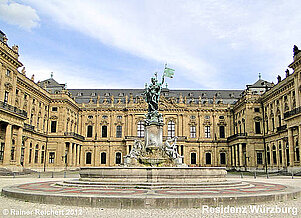
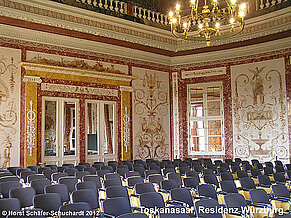
Program
The Macro 2019 will be held in four days, from 11th March (Monday) until midday of 14th March (Thursday) 2019, with a program including Keynote speakers, contributed talks, posters and group activities (mini-courses, discussion groups). The first day will be reserved for arrival at the city, with the registration, opening public keynote and icebreaker being directly at the city center in the Residence Palace. The following days will encompass submitted contributions and keynotes at the Biocenter of the University of Würzburg. The last day will have scientific program untl midday to allow for departure in the afternoon.
The detailed program can be downloaded here
For the social events and minicourses, please fill this formular here
• Monday, 11th March: Public opening keynote (4 pm, „Space-borne technologies to monitor the transformation of the world and its capabilities for macroecology“, Dr. Safi & Dr. Taubennöck) and icebreaker reception (6 pm) within the Residence Palace and its wine cellar. Wine tasting event and tour through the palace after the keynote until 8-8:30 pm (no dinner).
• Conference dinner (13th March, 7 pm) at the Bürgerspital
Keynote Speakers
Dr. Hannes Taubenböck (Earth Observation Center):
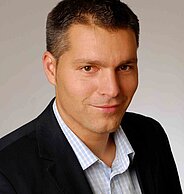
Dr. Taubenböck leads the team “Modeling and geostatistical analysis” at the German Aerospace Center (DLR). With his team he focuses on the development of methods and applications in the field of urban remote sensing. The works rank from classification approaches to studies on validation to geographical applications. Recently multidisciplinary research became a focus aiming to systematically apply earth observation data for new notions in urban geography.
Dr. Kamran Safi (Max Planck Institute for Ornithology):
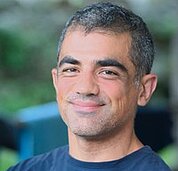
Dr. Safi's interests lie in understanding the causes and consequences of biological patterns at various scales and from different perspectives, from movement ecology to macro-ecology and macro-evolution. Methodologically Dr. Safi is deeply interested in combining and fusing data from the wild, using a wide range of sensors deployed on animals, with remote sensing and other sources of information at large spatial and temporal scales. Scaling up from individuals, to collectives, populations, species and species communities, his macro-ecological ambitions are to understand the scale effects associated with extrapolations from individuals to on higher taxonomic levels. Beyond that he is interested in the relationship of various diversity measures and what they can tell about how biological diversity has evolved and is maintained. Finally, from an macro-evolutionary perspective he is interested in the intersection of traits and occurrence of species, populations and individuals, as well as in the environment filters for certain traits and combinations thereof.
Prof. Dr. Alexandre Antonelli (University of Gothenburg, University of Harvard, Gothenburg Global Biodiversity Centre and Kew Royal Botanical Gardens):
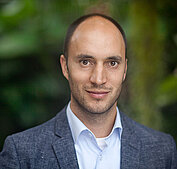
Prof. Dr. Antonelli's lab studies the evolution of biodiversity past, present and future. His studies have focused on elucidating the origins and evolution of the rich biodiversity of tropical regions, with a focus on the Andean and Amazonian regions of South America. His team combines genetic, fossil and distribution data from field surveys and remote sensing for understanding biodiversity patterns and the dynamics of the formation, extinction and migration of species. He is leading the development of approaches for the rapid quantification of biodiversity, by means of high-throughput DNA sequencing and citizen-science observations of species using mobile phones. Antonelli is also engaged in career development for young scientists and scientific outreach, and is an elected member of the European and the Swedish Young Academies. He leads a relatively large and diverse research group funded by competitive national and international grants.
Gothenburg Global Biodiversity Centre
Prof. Dr. Maria Dornelas (University of St. Andrews):
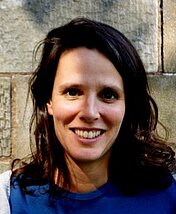
Prof. Dr. Dornelas' research focuses on quantifying biodiversity and understanding the processes that shape it. She often works on tropical systems and specifically coral reefs, but she also works with tropical freshwater fish, mangrove crabs and plants for example, as she is more question-driven that organism-driven. She combines ecological theory, synthesis of existing data, and fieldwork (preferably in exotic places!) in her research, and most of the research questions she is interested in fall under the disciplines of community ecology, macroecology and biogeography. She tends to work on intermediate spatio-temporal scales (that is communities and networks of communities over time-scales of years to tens of years).
Minicourses and discussions
1) Spatial Data Analysis - remote sensing using OpenSource software (organizers: Malin Fischer, Tobias Gutzmann, Jakob Rieser, Giovanni Joy)
Background: How can and why should Open Source tools like R and QGIS be used for spatial data analysis, especially in the field of remote sensing? Recent developments allow the use of vast amounts of free-to-use satellite data for numerous ecological applications. Open Source software provides free and convenient tools to process and analyse such data. The methods and results can then easily be reproduced and shared within the scientific community.
Content and requirements: This workshop will introduce participants to the basic tools of Open Source spatial data analysis in R and QGIS with a little theoretical input and much hands-on practice following an ecology-related example. Depending on the participants’ previous knowledge, we will cover topics like how to get spatial data into our software, mapping, land cover classification and time-series analysis. Basic knowledge of R, GIS and remote sensing is desired and please bring your own laptops with the latest versions of R (https://www.r-project.org/), RStudio (https://www.rstudio.com/) and QGIS (https://qgis.org/en/site/).
Maximal number of participants: 15-20
2) Animal Movement Analysis (organizer: Dr. Anne Scharf)
Background: Animal movement is critical for maintenance of ecosystem services and biodiversity. The study of complex movement patterns and of the factors that control such patterns is essential to inform conservation research and environmental management. Technological advances have greatly
increased our ability to track, study, and manage animal movements. But analyzing and contextualizing vast amounts of tracking data can present scientific, computational, and technical challenges that require scientists and practitioners to master new skills from a wide range of computational disciplines.
Content and requirements: In this workshop we will visualize, explore and perform basic analysis of animal movement data. We will give an insight into Movebank (database of animal tracking data) and how to get these tracking data into R. Additionally to visualizing, manipulating and analyzing the movement data in R, we will relate these to remote sensing data. Finally we will animate the movement of animals over time on a static or dynamic background of remote sensing data. We will provide course materials in form of R scripts. Participants should bring a laptop with R and RStudio installed. Please also install the packages raster, move and moveVis and their dependencies.
Maximal number of participants: 10
3) Towards more mechanistic distribution models (organizers: Prof. Damaris Zurell and Dr. Guillermo Fandos Guzman)
Background: Correlative species distribution models (SDMs) constitute the most widely used modelling approach in global change research. At the same time, we are well aware that they have several shortcomings when making predictions into the future. For example, they assume that species are (and will be) in equilibrium with the environment ignoring transient dynamics, they do not explicitly take into account interspecific interactions and adaptation, among others. Many scientists have called for more mechanistic models for more than a decade now. However, although several modelling platforms have been introduced, these models are still rarely applied. Why is that so?
Content and requirements: We will discuss the pros and cons of SDMs versus more mechanistic approaches, for example in terms of expected knowledge gain versus data limitation. A major advantage of SDMs is that software packages are readily available, many guides are available how to use SDMs, and they are really fast - at least these seem to be common perceptions. Here, we will try to correct some of these perceptions by introducing simple to complex approaches for taking into account mechanisms in dynamic distribution models. As we are quite time-limited, we can merely provide a brief overview about available software, mostly for coupling SDMs with dispersal and population dynamics models. Specifically, we will introduce a couple of R packages such as MigClim and demoniche but also highlight more sophisticated approaches like RangeShifter. Also, we will discuss aspects of calibration, sensitivity and robustness analyses, and model transferability. If time allows, we would be happy to discuss how these approaches could be further extended in the future, to improve on data integration and solve circularity issues. We will provide course materials in form of R scripts. Participants should bring a laptop with R installed. Please also install the packages raster, MigClim and demoniche and their dependencies.
Maximal number of participants: 15-20
For registration in one of the courses above, please fill this formular here. Besides the above-mentioned minicourses, we will also have a discussion panel:
4) Discussion panel "Meet the editors discussing hot topics" (organizers: Orga team Macro 2019)
Description: Participants of Macroecology 2019 that are editors will participate in a discussion panel about what are the research topics the editorial boards are mostly excited about, what are the journal policies about reviews, peer-review and preprints, open science, gender/ethnic diversity, special issues, this year's meeting logo: 'from local patterns to global challenges', and further topics. The panel will interact with questions from the audience and anybody interested and other editors present in the audience can join the panel (no limit in participants). Confirmed panel: Holger Kreft (Journal of Biogeography); Susanne Fritz (Proc B, Frontiers in Biogeography, Ecography); Christian Hof (PeerJ); Maria Dornelas (PeerJ, GEB); Jürgen Dengler (Phytocoenologia, Applied Vegetation Science); Matthias Schleuning (Functional Ecology).
How to get to Würzburg and conference venue
The best way to get to Würzburg if you are flying is to fly to Frankfurt am Main Airport (FRA). Please, pay attention that there is a Frankfurt Hahn Airport, which is actually far away and should be avoided. From Frankfurt am Main Airport there is the possibility to take fast ICE trains directly to Würzburg main station until 8 p.m. (ca. 1 hour and 30 min). Later train connections might require changing at Frankfurt main station and taking slower regional trains. Alternatively, you may also check flights to Nürnberg Airport, take a subway to the Nürnberg mainstation and a regional train (1 h and 20 min) or a fast train (1 h) to Würzburg (Note that early landing is also recommended). The main station in Würzburg is fairly central and all hotels are within walking distance. The registration, opening public talks and icebreaker on Monday the 11th are also planned to be in the city center (in the Residence Palace). Please, note that the other days will be held at the Biocenter of the University of Würzburg at Hubland campus. To reach the biocenter, we recommend to take the bus 14, 114, or 214 from the bus/train main station (further stops in the city center are at Barbarossaplatz and Mainfranken Theater) in the direction of Gerbrunn, Hubland (Universität Sportzentrum), Hubland/Mensa, respectively. Bus stops near the Biocenter: am Hubland for 14, Hubland/Mensa for both 114 and 214. Note that to assure arriving on time for the keynotes, you have to take buses departing from the city center before 8 a.m.. Relevant bus schedules can be checked here.
Important Dates
Abstract submission: talk contributions expired, but we still accept poster contributions
Registration (including payment): 15 January 2019 (Late registration still possible until end of February)
Abstract submission
Macro 2019 will welcome contributions for oral presentations (12 min presentation + 3 min discussion), poster presentations (A0: 80 x 120 cm, portrait layout), and group activities (mini-courses, workshops, discussion groups: 1,5-2,5 hours). Following the success of previous meetings, we encourage submission for group activities, which will take place at afternoon on the 13th. Abstracts should not exceed 300 words and should follow the template for oral and poster presentation or for group activities.
Abstracts should be sent to macro2019@uni-wuerzburg.de. Deadline for talks: expired. Last places for late registration and poster submission are still available and will be considered until the end of the month.
For any query or submission issues, please contact Prof. Juliano Sarmento Cabral ( juliano.sarmento_cabral@uni-wuerzburg.de).
Registration
Registration fees:
Postdoc and senior scientists: 130 €
Bachelor, Master and PhD students: 80 €
The payment can be done per transfer to account:
Recipient: Staatsoberkasse Bayern in Landshut
Bank: Bayerische Landesbank
BLZ: 700 500 00
Account-Nr: 1190315
Swift-Adress/BIC: BYLADEMMXXX
IBAN: DE75700500000001190315
USt.-ID-Nr. Universität Würzburg: DE 134 187 690
Purpose: 0002.0174.7262, Name of participant (this information is urgently requested on the bank transfer to identify the right account within the university!)
If the fee transfer is done by a third party, please send an email to macro2019@uni-wuerzburg.de letting us know the name of the payer in order to correctly allocate the payment to your registration.
Contributing participants will be asked the following information upon abstract decision:
Name:
Institution:
Diatery requirements (e.g. none, vegetarian, vegan, halal):
Participants without a contributing abstract should also register to the conference by sending the information on Name, Institution and Dietary requirements to the email macro2019@uni-wuerzburg.de.
The registration of both contributing and non-contributing participants will only be completed and confirmed after payment of conference fees. Deadline to registration and payment: 15th January 2019 (late registration possible until 28th February). Note that bank transfer can take a couple of days to complete.
Accommodation
We encourage booking accommodation in advance in the touristic city of Würzburg. Special discount in the daily prices can be obtained in the following hotels. However, note that to get the conference discount at the hotels listed in the webpage you have to book directly via the hotel's webpage, telephone or email. The hotels cannot give you the discount if you book via third party apps (e.g. Booking . com).
Hotel Melchior Park****
Am Galgenberg 49, 97074 Würzburg
info@hotel-melchiorpark.de
Free cancelling until 08.03.2019
Booking code (Please, to get discount do not use booking apps, book with the hotel directly): ABK UNI110319 (valid until 28.02.2019).
Hotel Walfisch***
Am Pleidenturm 5, 97070 Würzburg
walfisch@hotel-walfisch.com
Booking code (Please, to get discount do not use booking apps, book with the hotel directly): Macro2019 (valid until 11.02.2019)
Hotel Franziskaner***
Franziskanerplatz 2, 97070
Booking code (Please, to get discount do not use booking apps, book with the hotel directly) : Macro2019 (valid until 01.02.2019)
Hotel Strauss***
Juliuspromenade 5
Booking code (Please, to get discount do not use booking apps, book with the hotel directly): Macro2019 (valid until 11.02.2019)
Recommendation for young people (early booking required)
Babelfish Hostel Würzburg - info@babelfish-hostel.de
Deutsche Jugendherberge Würzburg - wuerzburg@jugendherberge.de
Organization
Juliano Sarmento Cabral - Ecosystem Modeling, Center for Computational and Theoretical Biology (CCTB), Faculty of Biology (for any query or request, please contact via juliano.sarmento_cabral@uni-wuerzburg.de)
Marcell Peters - Department of Animal Ecology and Tropical Biology, Faculty of Biology
Martin Wegmann - Remote Sensing Department, Conservation and Biodiversity Applications, Institute of Geography and Geology, Faculty of Arts. Historical, Philological, Cultural and Geographical Studies
Alice Claßen - Department of Animal Ecology and Tropical Biology, Faculty of Biology
Manuela Engert - CCTB, Faculty of Biology



